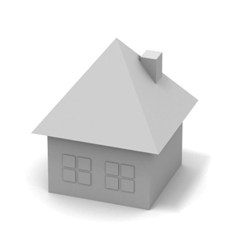Despite Common Belief, Many Debt Plagued Homeowners Can File for Chapter 7 Bankruptcy
For thousands of deeply indebted Americans, Chapter 7 bankruptcy has been a saving grace. But thousands more consumers are missing out on the opportunity for a fresh start because they mistakenly believe they can't file for Chapter 7 due to their status as homeowners.

It's a common myth that homeowners must file Chapter 13 bankruptcy while non-homeowners are free to take advantage of Chapter 7, explains a recent Bankrate.com article.
Chapter 13 does have its benefits. Known as reorganization bankruptcy, Chapter 13 bankruptcy provides protection against foreclosure while allowing a borrower to get caught up on mortgage payments or other debts over a period of three to five years.
For those with significant equity in a home, Chapter 13 offers a way to reduce debt - it just takes a while.
But when you're drowning in unsecured debts such as credit card debt, you may not have time to wait years to lower your bills.
Chapter 7, on the other hand, provides much more immediate help.
Credit card debt, medical bills, payday loans, utility bills and other debt not tied to any property can often be discharged in a matter of months. That means in mere weeks you could be free of all obligations to creditors.
Since people who file for Chapter 7 bankruptcy don't have to pay back debt out of pocket, their assets can sometimes be sold to pay off creditors. That's why Chapter 7 is known as liquidation bankruptcy, and why in the past homeowners have been steered toward Chapter 13 bankruptcy instead.
These days, though, many homeowners have little equity in their homes thanks to the recent mortgage crisis. Without much money tied up in a property, there's little reason for it to be repossessed.
In fact, Chapter 7 has earned another nickname in recent years: fresh-start bankruptcy. For homeowners with little equity and loads of unsecured debt, filing Chapter 7 can be the ticket to financial freedom.
Look at Chapter 7 as an upside to being upside-down in your mortgage.
Everyone's financial situation is a little bit different. If you're in over your head in debt, discussing your options with a bankruptcy lawyer can help you discover the most advantageous solution to your financial struggles.
Regardless of whether you qualify for Chapter 7 or Chapter 13, you can look forward to the same end result: With the right bankruptcy plan, you and your family will be well on your way to a debt-free future.
If you have questions about bankruptcy, our expert bankruptcy attorneys can answer them - no strings attached. Call DebtStoppers today at 800-440-7235 to sign up for your free one-on-one debt analysis.
More Blog Entries:
Fear of Losing Personal Items in Bankruptcy Often More Myth than Reality: December 7, 2012
For Borrowers Relentlessly Hounded by Debt Collectors, Bankruptcy Can Bring Peace and Quiet: February 8, 2013
Resources:
Can You File Chapter 13 Bankruptcy If You Own a Home? by Justin Harelik, Bankrate.com

